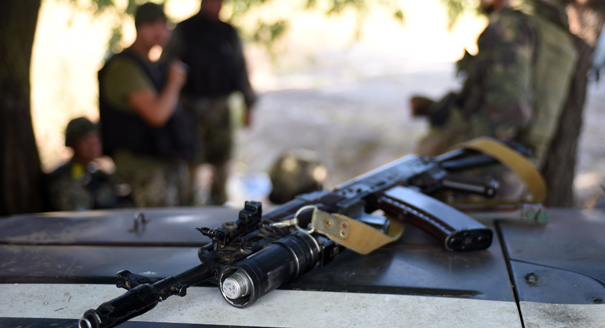Negotiations on arms control have gone through hard times in the last decade. Since Russia pulled out of the Treaty on Conventional Armed Forces in Europe (CFE) in 2007 and suspended in 2015 its participation in the Joint Consultative Group, which deals with questions of compliance with that treaty, promoting arms control has been far from promising.
And yet, surprisingly, at the 2016 Ministerial Council of the Organization for Security and Cooperation in Europe (OSCE) in Hamburg, the 57 participating states found consensus to relaunch talks on arms control. This issue could become the sole remaining instrument of confidence building between East and West—as it was during the Cold War.
Germany, which has held the OSCE Chairmanship in 2016, found support for its initiative to revive arms-control talks notably from smaller countries that want to strengthen cooperative security in Europe. More importantly, arms control is relevant for regional territorial conflicts in the OSCE area.
This complex issue, which includes developing confidence- and security-building measures, is tightly linked to the resolution of protracted conflicts in Moldova, Ukraine, and Georgia. The question is whether stalled negotiations on renewing the 2011 Vienna Document, which was supposed to increase the transparency of military activities in the OSCE’s zone of application, and on modernizing the CFE treaty can get anywhere without prior resolution of these territorial conflicts. One can just as well ask the opposite question: Can territorial conflicts be settled without the resumption of arms-control talks?
Currently, the situation in the region is so bleak that transparency of military activities and mutual confidence on security matters are at rock bottom.
The conflict between Moldova and its breakaway region Transdniestria illustrates the need for confidence- and security-building measures on a subregional level. Since 1993, little progress has been made toward settling that conflict. Moldova continues to struggle with a Russian military presence on the left bank of the Dniester River.
In summer 2016, there was an unprecedented quantity and quality of military exercises on both sides of the river. Moldovan national armed forces conducted exercises with U.S. troops not far from the security zone, a demilitarized stretch of land along the river that is patrolled by Russian, Transdniestrian, and Moldovan peacekeeping units. Transdniestrian and Russian forces carried out repeated and unannounced military exercises even inside the security zone. This was in open breach of the 1992 Moscow peace agreement that stated there should be no armed military or paramilitary forces in the security zone other than the peacekeepers and obliged Russian forces to observe neutrality.
Recently, both Moldova and Ukraine have sharpened their rhetoric on their long-standing demand for a full and immediate withdrawal of Russian troops and munition from Moldovan territory. This was accompanied by Moldova’s repeated call to convert the current peacekeeping operation into a multinational civilian mission under an international mandate. Things could change under Moldovan President-elect Igor Dodon, who has announced his intention to improve ties with both Russia and the newly elected head of Transdniestria, Vadim Krasnoselski.
The conflict in eastern Ukraine shows even more drastically that improving confidence- and security-building measures under the Vienna Document is essential for security and stability in Europe. There have been no inspection or verification visits to the Crimean Peninsula since it was annexed by Russia in March 2014. This explains why Ukraine is skeptical about the German initiative, led by Foreign Minister Frank-Walter Steinmeier. CFE inspections could theoretically be carried out only on Ukrainian territory, because Russia has abandoned the CFE treaty.
Georgia is even worse off, because the OSCE does not even maintain a field mission on the ground anymore to help foster confidence-building between Georgia and its breakaway republics, Abkhazia and South Ossetia.
Caught in this geostrategic disarray, the in-between states of Moldova, Ukraine, and Georgia have similar needs and demands. They are adamant about the principle of host-nation consent— that they must agree to the deployment of foreign troops on their territories—a principle that for them is a prerequisite to any kind of arms-control regime.
Russia has violated the 1994 Budapest Memorandum, in which Moscow committed to Belarus, Kazakhstan, and Ukraine that in exchange for their renunciation of nuclear weapons, it would respect their sovereignty, territorial integrity, and political and economic independence. As a result, security guarantees are absolutely vital for these states.
What does this mean for the German initiative to revive arms control? The idea of a so-called structured dialogue—an open-ended format outside the OSCE that does not exclude negotiations under the organization’s auspices later—is a provisional arrangement acceptable to all participating states. But it remains questionable whether successive OSCE chairs will be able to follow up on it.
Russia has firmly excluded a return to the old formats of the CFE treaty. Moscow has also blocked the modernization of the Vienna Document. Whether it is paying lip service to Steinmeier or not, Russia continues to send out some signals of cooperation and comes up with occasional proposals, such as a simplified verification regime comparable with treaties in the nuclear field. But these overtures are far from substantial and find little resonance among Western partners.
On the one hand, the OSCE faces the problem that to find a way out of the arms-control dilemma, progress is needed on solving regional conflicts. On the other hand, military transparency, risk-reduction measures, and exchange of information are essential for advancing the settlement of those conflicts. These mutually exclusive options point to a vicious circle. It is difficult to see that circle being broken in 2017.
Nadja Douglas is a research associate at the Center for East European and International Studies in Berlin.







.jpg)
